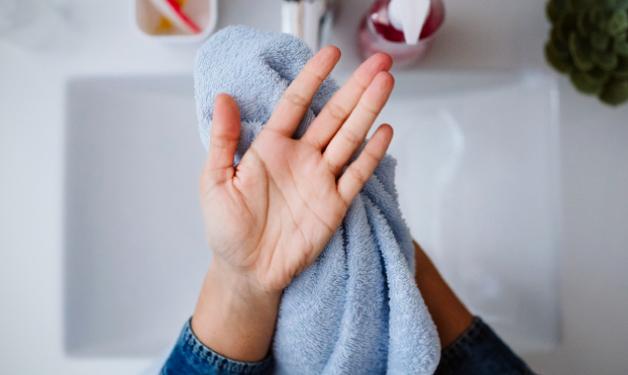
With the increase in hand washing and sanitizing due to the COVID-19 pandemic, Dr. Harvey Lui shares how to care for dry, cracked skin.
Q: How can I continue washing my hands this often, but also stop my skin from drying out?
A: Every time you wash your hands and they’re wet, you’re adding moisture to your skin. But when you wash and dry the skin over and over again, you eventually leach out all of its natural lipids (i.e. oils) and it can become dry and brittle. The key is to restore some of those lost lipids by applying emollient lotions and creams (i.e. moisturizers) that act as barriers to protect your skin.
The best technique, particularly if you’re someone with skin that is prone to drying, is to wash your hands and then shake most of the water off rather than drying them completely. While your hands are still moist, apply your moisturizer of choice to lock in moisture. There’s no point applying moisturizer to dry skin as it does not absorb as well. You want to apply it to clean, moist or slightly wet skin.
Q: Are certain soaps more drying than others? Should I be avoiding specific soap ingredients?
A: Some soaps are definitely harsher than others, especially dish soap or laundry soap, which are not meant for use on skin. In this time of COVID, everyone is cleaning more than usual and if you over-clean your hands using something like dish soap, you’re going to dry them out. Make sure you are washing your hands with soaps that are actually meant for skin.
Q: Does cracked, dry skin put me more at risk of getting a viral or bacterial infection?
A: Cracked, dry skin or any break in the skin, provides an opportunity for bacteria and viruses like staphylococcus bacteria or fungal infections to enter the body and cause health problems.
A break in the skin also means you can more easily pass an infection from yourself to others. If you’ve developed an open sore, or multiple sores on your hands, you need to reconsider whether it’s okay to do work with your bare hands. If this occurs, consider using gloves or even taking time away from work to let your skin heal and to prevent the possible spread of microbes or an infection through your open skin.
Q: Can I apply lotion or cream onto broken skin?
A: Yes, but if the skin is open, bleeding or clearly infected, you need to take care of the wound first. The best general product to apply to broken skin or sores is plain Vaseline—just like our grandmothers used to recommend! Many people, including those working in health care, have believed for a long time in using Polysporin-type products to treat broken skin, but what dermatologists have discovered is that two to three per cent of the population are actually allergic to the ingredients in Polysporin. And in general the chance of catching an infection is actually lower than the possibility of having an allergic reaction to Polysporin. The chance of an allergic reaction to Vaseline, however, is almost zero and it really does help protect the skin and create an environment that allows the skin cells to migrate in and heal the wound.
Q: Is everyone's increased handwashing actually slowing the spread of COVID-19?
A: Researchers are in the early stages of studying this, but it is a strong presumption. There’s really no question though that frequent handwashing decreases the chances of catching or passing on a variety of different infections so it’s very reasonable to believe that an increase in good hand hygiene practices has helped limit the spread of COVID-19.



